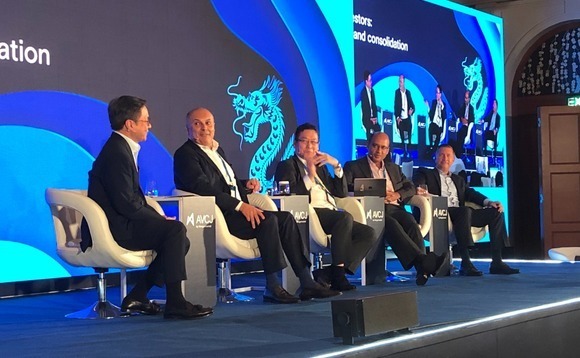
Investors see 2022 as a 'turning point' in GP-LP relations - AVCJ Forum

The private equity industry has undergone a profound shift as under-allocations have become over-allocations, fundraising and deployment have slowed, and the dynamic between GP and LPs has changed, the AVCJ Private Equity & Venture Forum heard.
"We will look back at 2022 as a turning point. We witnessed central banks rattle the markets by engaging in the most aggressive interest rate increases in decades," said Ivan Vercoutere, managing partner and CIO of LGT Capital Partners.
"It has created an environment where most LPs have seen their proportionate allocations to alternatives increase due to the denominator effect. The 60-40 portfolio followed by many investors has seen the worst performance in 100 years."
Vercoutere compared the contraction of fundraising and deployment cycles from 4-5 years to 2-3 years to the period immediately before the global financial crisis. LPs have come under pressure first because their budgets were consumed by re-ups and then by the denominator effect as plummeting public markets left them proportionately overallocated to private equity.
"I was worried at the beginning of 2022 that we would not be able to get into some of our relationships in a sufficient manner because there were too many people in the market, but fundraising has since slowed, observed Hideya Sadanaga, a senior managing director and head of private equity investment at Japan Post Bank.
Greg Jania, global co-head of private equity at APG Asset Management, added that he was under-allocated to the asset class 10 months ago and is now "over-allocated by an order of basis points." However, approximately 40% of APG's portfolio GPs are currently in the market and the slowdown in fundraising has seen the balance of power swing back towards LPs.
"We've had better negotiating power in the last six months than in the last 12 years," Jania said, noting that terms have become even more LP-friendly than during the three months early in the pandemic when managers were nervous about the market outlook.
Ankur Meattle, head of Asia private equity funds and co-investments at GIC, said that his team is being a lot more stringent in GP due diligence. One area of focus is whether GPs have been able to exit at a premium to their previous valuations – and have done this consistently through upcycles and downcycles.
APG's public markets net asset value is down 26% so far this year but private valuations are still up over the same period. According to Jania, this does not only reflect the lag between public and private markets but also the "GP smoothing effect" as managers build in cushion valuations; the average markup in APG's portfolio between exit and the prior quarter is 32%.
Now, though, he is starting to see that cushion valuation disappear or go negative. It contributes to his expectation that "we are beginning to see an era of lower private equity performance."
LGT previously studied 25,000 investments going back 25 years to test the standard GP assertion that they underwrite to a 2-3x multiple and target a 25% IRR. Only one in five investments achieved 2-3x, although the average was 2.5x, underlining how a handful of strong deals in each portfolio are responsible for driving up returns and minimising loss ratios, Vercoutere explained.
"We estimate that one in seven investments made in the last five years has been realised. There was so much liquidity and valuations went up so much because the cost of capital was low, and we entered 2021 with the lowest loss ratio in history – it was in the high single digits," he said, noting that the loss ratio ballooned to 35% in the global financial crisis-hit 2006-2007 vintage.
"Is it going to go up? I think so. At what multiple will exits be done given we have come off a high valuation environment and we have seen a reset of multiples in the public markets?"
Vercoutere believes Asia could lose out during the current cycle as investors flee to the perceived safety of the US and Europe. He observed that historical returns from Asia have been good, "but they have taken longer to come," resulting in robust multiples but lagging IRRs.
Much rests on whether LPs will go against the flow and continue allocating while others withdraw. Meattle said that GIC would stay the course, noting that the sovereign wealth fund regards Asia as a long-term game and identifying several positive trends.
"Valuations are getting better, and more control deals are coming through; Japan and Korea are delivering spinouts and we see succession deals coming through. We are also seeing opportunities in areas like advanced manufacturing and sustainability in China that are interesting," he said.
Latest News
Asian GPs slow implementation of ESG policies - survey
Asia-based private equity firms are assigning more dedicated resources to environment, social, and governance (ESG) programmes, but policy changes have slowed in the past 12 months, in part due to concerns raised internally and by LPs, according to a...
Singapore fintech start-up LXA gets $10m seed round
New Enterprise Associates (NEA) has led a USD 10m seed round for Singapore’s LXA, a financial technology start-up launched by a former Asia senior executive at The Blackstone Group.
India's InCred announces $60m round, claims unicorn status
Indian non-bank lender InCred Financial Services said it has received INR 5bn (USD 60m) at a valuation of at least USD 1bn from unnamed investors including “a global private equity fund.”
Insight leads $50m round for Australia's Roller
Insight Partners has led a USD 50m round for Australia’s Roller, a venue management software provider specializing in family fun parks.








